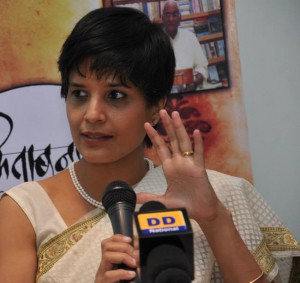Julian Barnes, “The Noise of Time” and Wolfgang Hilbig, “I”
 But endless terror continued for another five years. Until Stalin died, and Nikita Khruschev emerged. There was the promise of a thaw, cautious hope, incautious elation. And yes, things did get easier, and some filthy secrets emerged; but there was no sudden idealistic attachment to the truth, merely an awareness that it could now be used to political advantage. And Power itself did not diminish; it just mutated. The terrified wait by the lift and the bullet to the back of the head became things of the past. But Power did not lose interest in him; hands still reached out – and since childhood he had always held a fear of grabbing hands.
But endless terror continued for another five years. Until Stalin died, and Nikita Khruschev emerged. There was the promise of a thaw, cautious hope, incautious elation. And yes, things did get easier, and some filthy secrets emerged; but there was no sudden idealistic attachment to the truth, merely an awareness that it could now be used to political advantage. And Power itself did not diminish; it just mutated. The terrified wait by the lift and the bullet to the back of the head became things of the past. But Power did not lose interest in him; hands still reached out – and since childhood he had always held a fear of grabbing hands.
Julian Barnes’s latest novel, The Noise of Time, is about the Russian composer Shostakovich. It is about how he 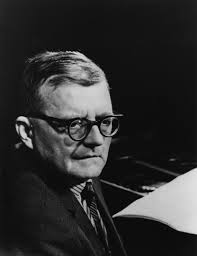 practised his art, trying to lead a normal life during Stalin’s regime and it was not easy. Shostakovich never joined the Communist Party while Stalin was alive. He did so much later in 1960 when he was to be appointed by the government as General Secretary of the Composer’s Union and had to be a party member in order to hold the post. ( It was the second time in his life that Shostakovich’s son, Maxim, saw his father weep.) Julian Barnes has for more than fifty years been a fan of Shostokovich. As he says in an FT interview, “My brother used to sell me the classical music records he most despised or had grown out of.” ( 22 Jan 2016, http://www.ft.com/cms/s/2/b6432f9e-bf64-11e5-846f-79b0e3d20eaf.html )
practised his art, trying to lead a normal life during Stalin’s regime and it was not easy. Shostakovich never joined the Communist Party while Stalin was alive. He did so much later in 1960 when he was to be appointed by the government as General Secretary of the Composer’s Union and had to be a party member in order to hold the post. ( It was the second time in his life that Shostakovich’s son, Maxim, saw his father weep.) Julian Barnes has for more than fifty years been a fan of Shostokovich. As he says in an FT interview, “My brother used to sell me the classical music records he most despised or had grown out of.” ( 22 Jan 2016, http://www.ft.com/cms/s/2/b6432f9e-bf64-11e5-846f-79b0e3d20eaf.html )
The Noise of Time opening scene is about the performance of Lady Macbeth of Mtsensk on 26 January 1936 at the Bolshoi Theatre. Shostakovich attended the operatic performance in the presence of Stalin and his Politburo comrades, Molotov, Mikoyan and Zhdanov. It had been a success at home and abroad for more than two years, making Stalin curious. Two days after Shostakovich witnessed Stalin at the theatre, the Pravda carried a scathing article — “Muddle instead of music”. Subsequently, many commissions for Shostakovich dried up. It is said his income fell to at least one-third of what he had been earning. Even his patron, Marshal Tukhachevsky, was unable to help. During the Great Terror which was to follow Shostakovich was fearful of his life. He lived in great dread of being taken away in the middle of the night as many of his friends and neighbours had been and shot including Marshal Tukhachevsky. But he never was. ( The sketch of the man on the book cover looking over his shoulder anxiously while holding a suitcase is meant to be the composer who for a while waited with a packed suitcase every night waiting to be picked up.) Within these stifling circumstances he tried to lead as normal a life he could, much like his father who ‘was an entirely normal human being’. ( p.22) His music began to be more conservative and in 1946 he composed a cantata, Song of the Forests, praising Stalin as a great gardener. Yet Shostakovich never left Russia. He did go abroad for performances and represented his country officially but he never left unlike Stravinsky.
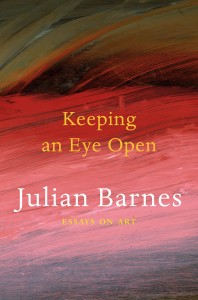 Julian Barnes novel is bio-fic ( to use David Lodge’s term for such literature). It is a sophisticated tribute by one artist to another, the writer imaging the trauma the composer experienced during Stalinism. In his book Keeping an Eye Open ( published 2015) a collection of essays on art and artists, Barnes says, “Artists are greedy to learn and art is self-devouring… .” ( p.103). He then puts forth an old idea of the artist being a voyeur. “This is exactly what the artist should be: one who sees ( and voyeur can also carry the sense of hallucinatory visionary).” (p.123) In The Noise of Time Barnes probably is so focused on the relationship that Shostakovich had with the Stalinist state that it occupies the bulk of the story. Then the writer gallops through the remaining years reducing even Boris Pasternak to a passing reference and not even mentioning the legendary black and white production of Hamlet ( 1964). It was based on Pasternak’s translation and
Julian Barnes novel is bio-fic ( to use David Lodge’s term for such literature). It is a sophisticated tribute by one artist to another, the writer imaging the trauma the composer experienced during Stalinism. In his book Keeping an Eye Open ( published 2015) a collection of essays on art and artists, Barnes says, “Artists are greedy to learn and art is self-devouring… .” ( p.103). He then puts forth an old idea of the artist being a voyeur. “This is exactly what the artist should be: one who sees ( and voyeur can also carry the sense of hallucinatory visionary).” (p.123) In The Noise of Time Barnes probably is so focused on the relationship that Shostakovich had with the Stalinist state that it occupies the bulk of the story. Then the writer gallops through the remaining years reducing even Boris Pasternak to a passing reference and not even mentioning the legendary black and white production of Hamlet ( 1964). It was based on Pasternak’s translation and 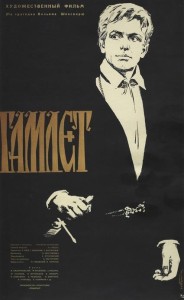 Shostakovich composed the music.
Shostakovich composed the music.
While one can appreciate Julian Barnes tribute to a musician he has long admired, it is the timing of the publication of the novel that has to be lauded. The Noise of Time is published in 2016, the 400 year birthday celebrations of Shakespeare’s wherein the story of Shostakovich revolves around his musical interpretation of Macbeth. It is also exploring the life of an artist under Stalin’s version of communism in Russia. A form of government that came with the Russian Revolution of 1917, nearly a hundred years ago.
Another book that is worth mentioning here given the many similarities it shares with The Noise of Time is I 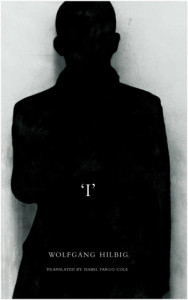 by Wolfgang Hilbig, translated from the German by Isabel Fargo Cole. It is not an easy book to read for its shifts in literary texture and excessive reliance on interior monologues that can be disconcerting. It is a fear that he lived with in East Germany given how the Ministry for State Security, or Stasi, employed a vast network of official collaborators including literary figures. So Hilbig was never able to trust anyone even though he was never implicated. I , is a book that leaves the reader very disturbed for the paranoia conveyed by Hilbig in his book written from the perspective of a writer-informant. This feeling of fear is what one is left with upon closing the book.
by Wolfgang Hilbig, translated from the German by Isabel Fargo Cole. It is not an easy book to read for its shifts in literary texture and excessive reliance on interior monologues that can be disconcerting. It is a fear that he lived with in East Germany given how the Ministry for State Security, or Stasi, employed a vast network of official collaborators including literary figures. So Hilbig was never able to trust anyone even though he was never implicated. I , is a book that leaves the reader very disturbed for the paranoia conveyed by Hilbig in his book written from the perspective of a writer-informant. This feeling of fear is what one is left with upon closing the book.
This unforgiving and constant fear can only be experienced and it is not a figment of anyone’s imagination or relegated to history books. It is still to be found in nations where freedom of expression is stifled and it is even more alarming when it is done using official machinery. At such moments it is immaterial whatever the political system — whether a communist or a democratic state. The full import of living with this kind of round-the-clock anxiety can never really understood by writers and readers distanced from such authoritarian regimes but these stories could be read as appreciating art for art’s sake. Having said that The Noise of Time and I are going to be spoken about for a long time to come for the tremendous impact they are going to have on literature and the art of writing.
Julian Barnes The Noise of Time Jonathan Cape, London, 2016. Hb. pp. 180.
Julian Barnes Keeping An Eye Open Jonathan Cape, London, 2015. Pb. 280
Wolfgang Hilbig I (translated from the German by Isabel Fargo Cole), Seagull Books, 2015. Hb.
28 January 2016

